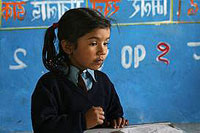The current crisis in financial markets and the world economy is having a profound effect on both governments’ global development commitments and national resources. Households already most vulnerable to poverty, risk further impoverishment as unemployment rises and incomes are reduced. There is widespread concern that progress in health and education will be severely undermined.
This is the second in a series of articles on the how the economic downturn impacts people already affected by HIV and how investment in sustainable financing is critical for global AIDS and development responses. The World Bank has just published a report that explores these issues in depth.

Averting a Human Crisis during the Global Downturn: Policy Options from the World Bank's Human Development Network states that a number of countries are already facing shortages of AIDS drugs due to the economic crisis.
Credit: Courtesy of the World Bank
The worldwide economic downturn may already be causing hardship in supplying life-saving drugs to people with HIV, according to a new World Bank report which highlights the clear and rising human cost of the current financial climate.
Averting a Human Crisis During the Global Downturn: Policy Options from the World Bank's Human Development Network, reports preliminary findings from a survey in 69 countries showing that 8 countries already face shortages of antiretroviral (ARV) drugs or other disruptions to AIDS treatment. The survey, conducted by the World Bank, UNAIDS and the World Health Organization last month also contends that, in total, respondents in 22 countries in Africa, the Caribbean, Europe and Central Asia, and Asia and Pacific expect the crisis to impact treatment programmes over the coming year. Together, these countries are home to more than 60 percent of people worldwide on ARVs.
This is a serious development. Despite rapid recent expansion in the numbers of people receiving treatment, two thirds of those in need of such drugs still do not get them. And unmet need is growing faster than treatment access is expanding. The global crisis seems likely to exacerbate the situation.
"This new report shows that people on AIDS treatment could be in danger of losing their place in the lifeboat,” says Joy Phumaphi, the World Bank's Vice President for Human Development and former Health Minister for Botswana.
Prevention programmes in jeopardy
We cannot afford a ‘lost’ generation of people as a result of this crisis. It is essential that developing countries and aid donors act now to protect and expand their spending on health, education and other basic social services and target these efforts to make sure they reach the poorest and most vulnerable groups.
Joy Phumaphi, the World Bank's Vice President for Human Development
HIV prevention programmes are also in jeopardy. The report states that survey respondents in 34 countries, where 75 percent of people with the virus live, expect prevention programmes for their key populations at higher risk (including sex workers and people who inject drugs) to be adversely affected as they are marginalized and tend to get lower priority than say pregnant women and children.
The world has made an international commitment to providing universal access to HIV prevention, treatment, care and support services to those in need by 2010. The global scale up towards this key goal, which has been gathering momentum, may well be threatened by what the report calls “these extraordinarily challenging times for the global economy.”
In Averting a Human Crisis During the Global Downturn, the Bank is encouraging countries which depend extensively on external donor AIDS financing to identify impending cash shortages as far as possible in advance, and to liaise with the Bank and other partners to help to mobilize 'bridge financing' that prevents interruptions to AIDS treatment. At the same time, the Bank warns that maintaining and expanding effective HIV prevention programmes during the current crisis is essential to guard against a resurgence of new infections.
Potential cuts in health and education financing
The World Bank is concerned that the downturn will lead to cuts in health and education financing across the board, not only in the sphere of AIDS. The report also shows how previous crises have forced developing countries to cut back on spending in these areas. Evidence from past downturns in Argentina, Indonesia, Thailand, and Russia shows that governments were forced to cut health services as a result of shrinking budgets and that returning health spending to pre-crisis levels took up to 10-15 years.
”We cannot afford a ‘lost’ generation of people as a result of this crisis,” Phumaphi contends. “It is essential that developing countries and aid donors act now to protect and expand their spending on health, education and other basic social services and target these efforts to make sure they reach the poorest and most vulnerable groups.”
In support of this strategy, on 24 April the World Bank stated that it was mobilizing up to US$ 3.1 billion this year in health financing to help poor countries battle threats to their social services during the global crisis. This effectively triples Bank support from US$ 1.0 billion in 2008 and will be used to strengthen health systems in poor countries, boost their performance in preventing and treating communicable diseases, and improving child and maternal health, hygiene and sanitation.
The Bank also said it was doubling its education financing this year in low- and middle-income countries to US$ 4.09 billion.
This report draws heavily on ongoing collaborative work by the World Bank, UNAIDS and WHO which will be released soon in a joint publication. Information was collected by agency representatives working closely with the National AIDS authorities in 69 low- and middle-income countries, which together include most people on treatment in the developing world. Preliminary conclusions are referenced here for consideration at the 2009 IMF World Bank Spring Meetings in Washington DC.



